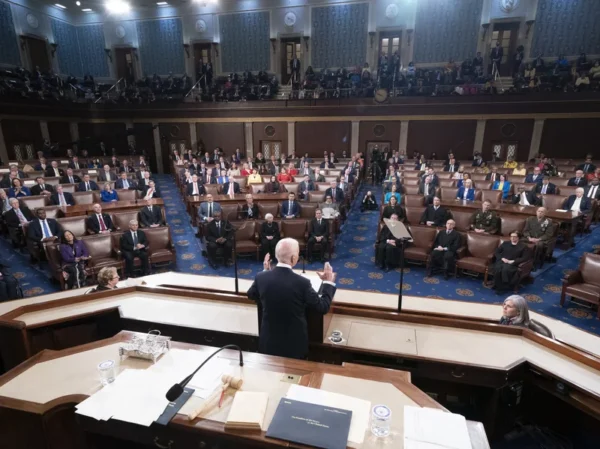On March 1 was President Biden’s State of the Union address before Congress, in which he discussed the situation in Ukraine, touted several accomplishments during his administration’s first year, and presented a four-point “Unity Agenda” for what he would like the nation to accomplish in the years to come.
Normally the president delivers the SOTU address toward the end of January but the Whitehouse delayed the event this year citing the ongoing Olympics and the pandemic with Omicron still raging. But some quipped the real reason was that Mr. Biden had not yet accomplished much, with some signature legislation dead in the water.
“Delivering the State of the Union in March would give Biden more time to try to accomplish some of his legislative goals before addressing Congress and the nation,” wrote Clare Foran for CNN.
The speech, which lasted just over an hour, was attended by mostly-unmasked members of the House of Representatives and the Senate, and viewed by an estimated 37 million people.
After beginning his address by offering support to Ukraine, he spent most of the time jumping through a long list of accomplishments (he signed about 80 bills during his first year), and talking about future work. He affirmed his support for women’s rights to abortion, which is currently before the Supreme Court, urged Congress to pass gun control measures, and pushed for Congress to pass voting rights legislation, which he felt would defend American democracy.
He also stated that, contrary to many of his liberal colleagues, he is in favor of providing more funding to law enforcement. Polling now suggests that safety has become a top concern of Americans.
President Biden promised to work toward more national unity during his campaign, and he brought up that goal again in his address. Not a focus on unity among citizens in society, his message was directed to Congress — urging them to pass legislation on a bipartisan basis: addressing the opioid epidemic, providing resources for children’s mental health, ending cancer, and supporting veterans.
Domenico Montanaro, writing for NPR, observed that this year’s SOTU appeared to be met by a more-unified Congress. “Watchers of the State of the Union addresses are pretty used to seeing, literally seeing, partisan applause lines,” he wrote. “But for the most part, the mood was more unified on Tuesday night.” But he also added that most of the unity was due to the president’s comments on Ukraine.
Brett Samuels, writing for The Hill, painted a less-rosy picture, stating that bipartisanship was only periodically on display — on Ukraine, and on Biden’s comments in support of funding for law enforcement. He added that the evening was also marked with tension as conservative Rep. Marjorie Taylor Greene (R-Ga.) and Rep Lauren Boebert (R-Colo.) shouted out during the address.
Biden’s State of the Union address was met with tepid response even from mainstream media, and the response was worse elsewhere. The Economist wrote that Biden’s address failed to impress — that after 50 years of being in Washington himself and attending a fair share of SOTU’s during that time, Biden’s first attempt at delivering one “was hardly triumphant.”
The Economist article opined that “after a little more than one year in office, Mr. Biden is in a slump. Setback has piled atop setback. After months of agonizing negotiations, the signature legislative agenda of the administration — a gargantuan safety-net and climate-change spending package called Build Back Better — is in effect dead,” and then went on to talk about high inflation and his pandemic response.
– The Byway
Feature image caption: Biden addresses congress in the State of the Union. Courtesy NPR.

